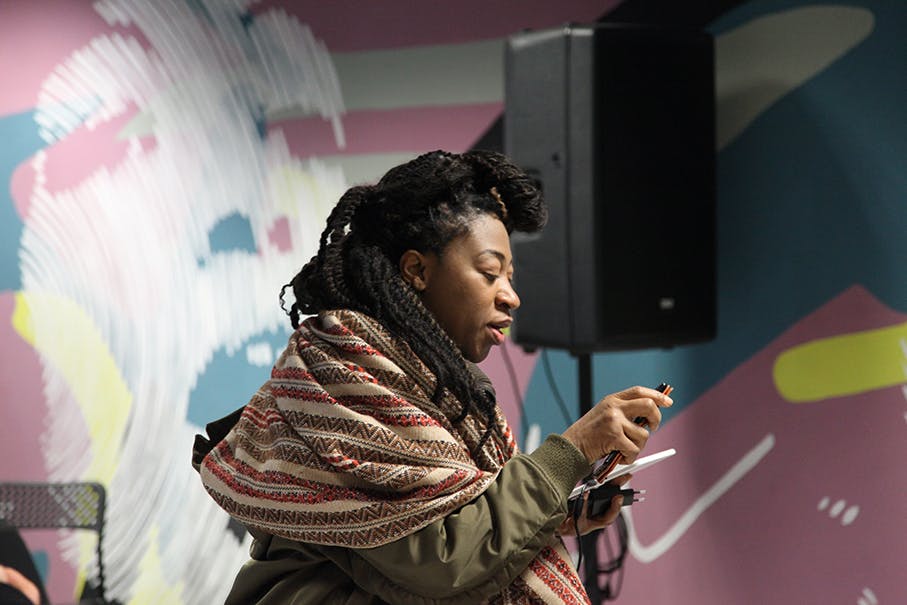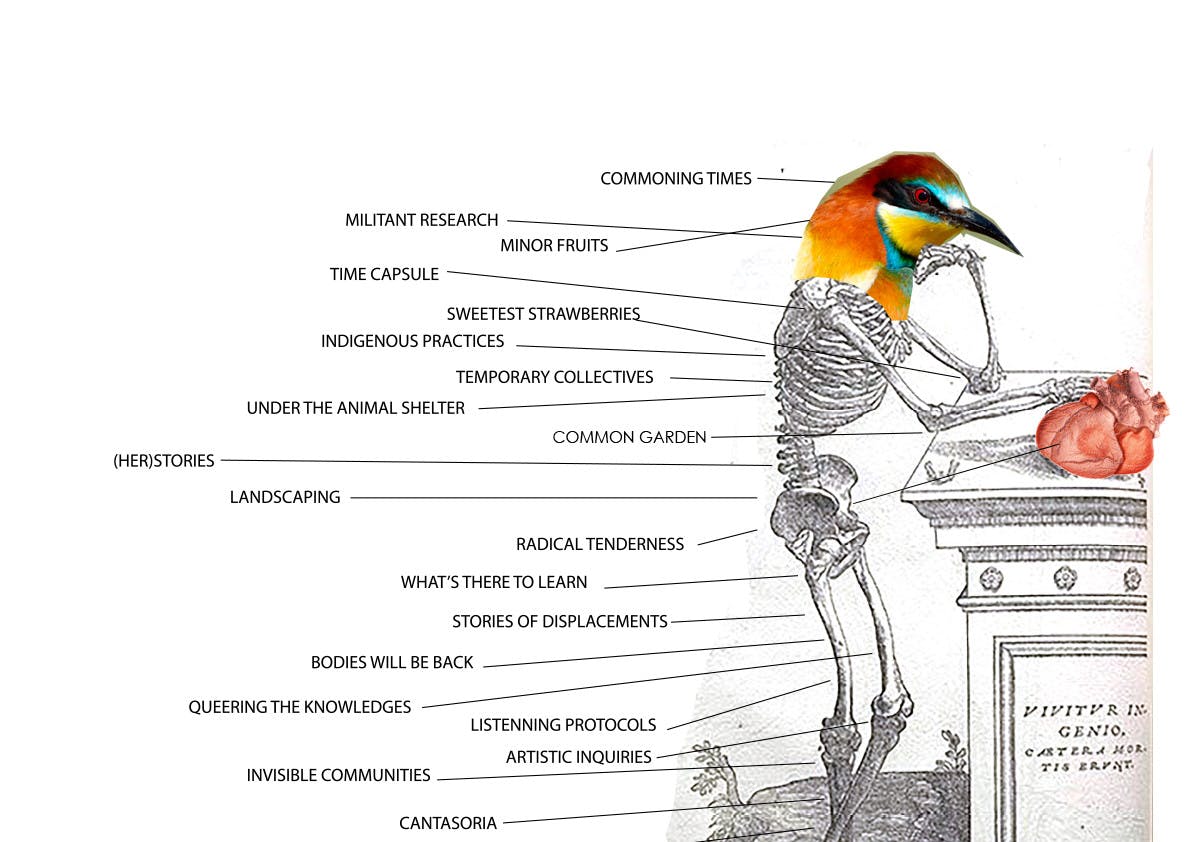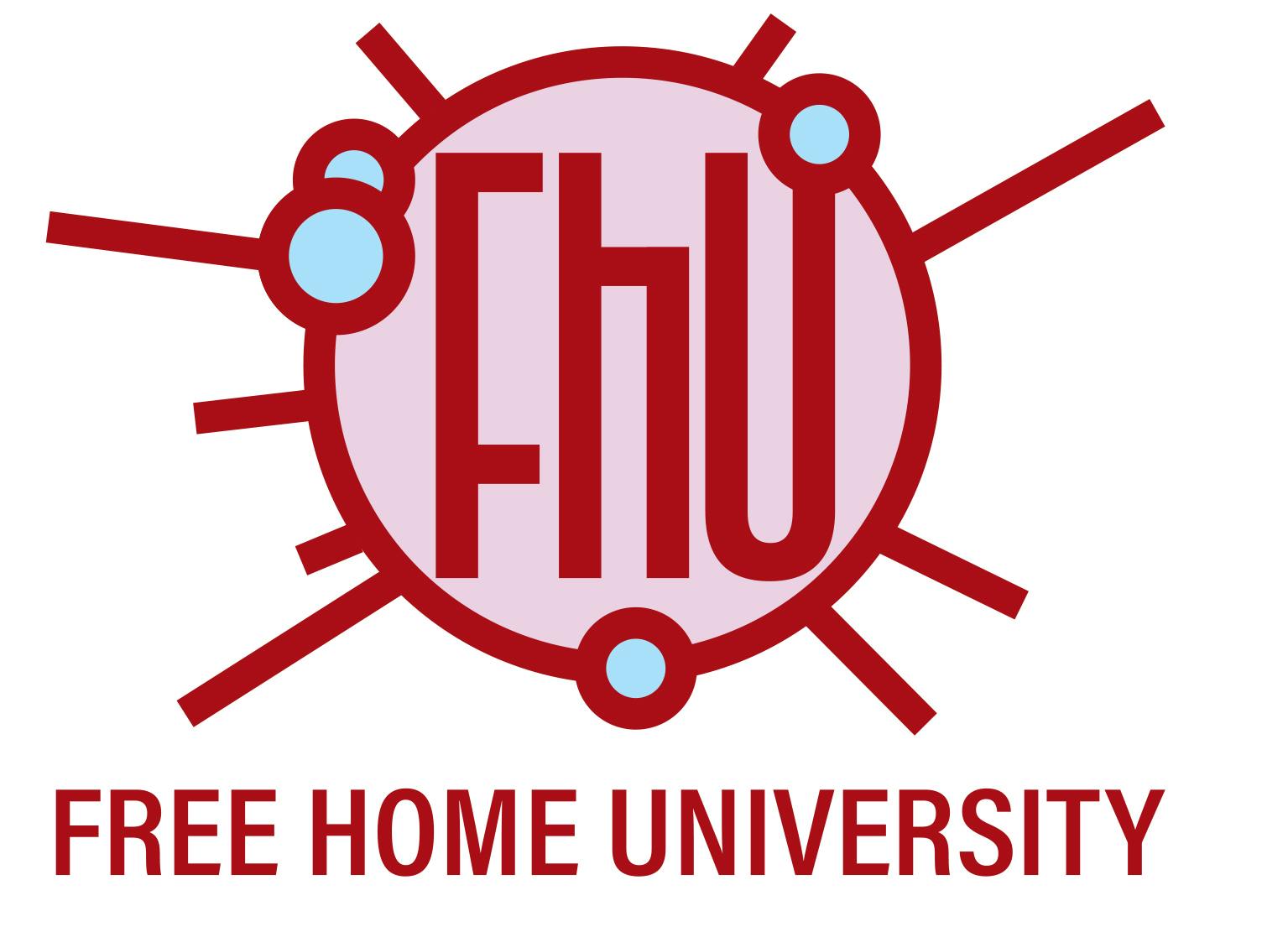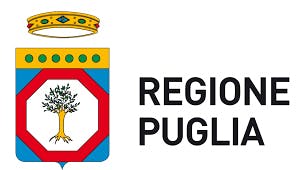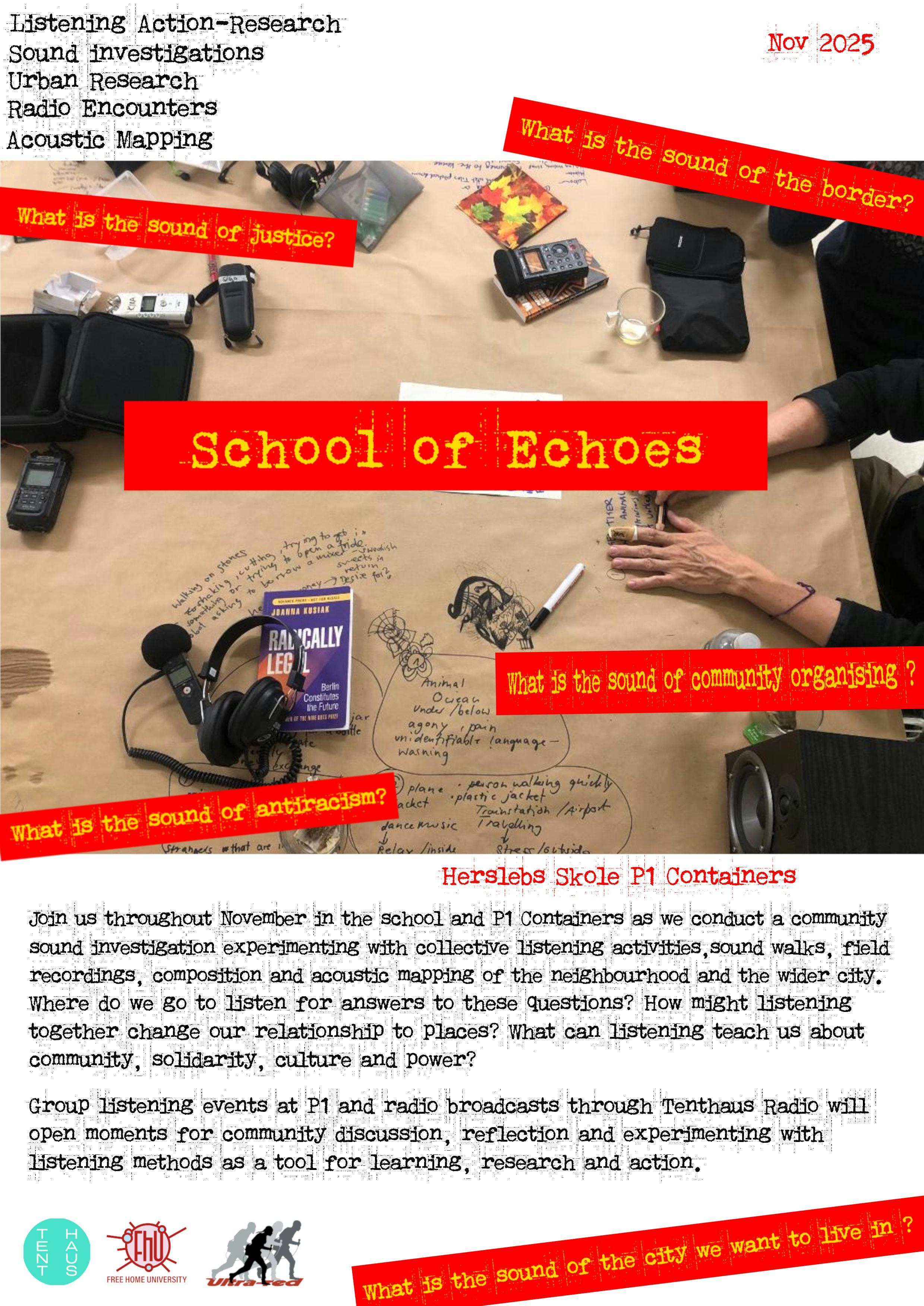BODIES WILL BE BACK || an open session with an audience (the Script)
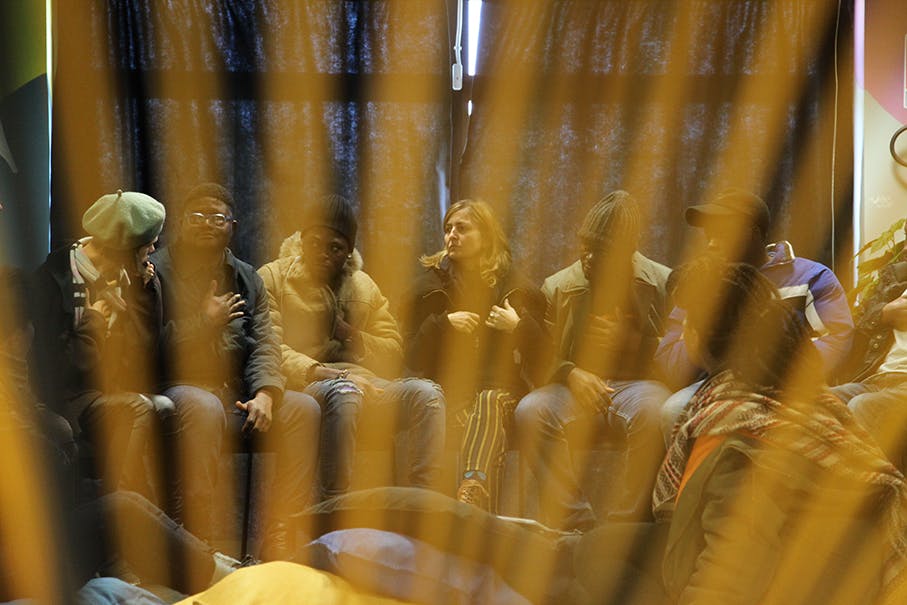
Ale: (always alternating in English, and in Italian): welcome all, thank you for joining us in this reflective evening. This week, in this very space we have been working with La Toya Mainly Spain and Dani d’Emilia, some members of the dance company Fuori Luogo (directed by Barbara Toma), participants of FHU and members of the refugee community in Lecce. We have paid particular attention to personal and collective struggles, furthering questions around how to listen to each other, how be in solidarity, what are the most compelling questions of our time that we need to answer together, with all our different perspectives, acknowledging the complexities of different stories, situations and backgrounds. Tonight we will present you our invitation to solidarity.
PART 1
KERELÊ SONG (Latoya leads, we reply in chorus):
KÉrelÉ
KÉrelÉ Ỏ
KerÉle Oxúm
Omiyawa (call\ response)
Oxúmbawe!
Omiyawa
Oxem Oxúm
Omiyawa (call\ response)
HONOURING OUR ANCESTORS exercise
Latoya: We are now honouring those who passed, black or white, men or women, who gives us power, who encourage us, who inspire us
The group forms a large circle, including the audience, holding hands and naming one after the other the names of those who passed: Audre Lorde, Nonna Domenica, Nonna Ambrogina, Pier Paolo Pasolini, Hannah Arendt, Patrice Lumumba, Rosa Parks, Antonio e Marianna, Martin Luther King, Anna Gobetti and many other...
OXUM introduction
Latoya: Oxúm is the mother of the African sweet waters. She reigns over love, intimacy, beauty, wealth and diplomacy. She is the protector of the poor. She is the one who brings them what they need in this life, during periods or weakness. She is connected to destiny and divination and is the patroness of artists, witches and diviners. She is known for healing the sick and bringing prosperity to communities. Her ways
are pleasant and her path leads to peace.
PART 2
(We take our chars on the stage)
YEMANJÁ INTRODUCTION
Latoya: Yejemanja rules the water and oceans. She is the
essence of motherhood, forgiveness and unconditional love. She is a fierce
protector of children and has a compassionate healing force. She is the Sea
Mother bringing fish to the fishermen, protecting boats travelling on the sea.
She is also associated with the power of transformation in one’s life.
Ale: 178,277crossed / 3,095 died or went missing crossing into Europe in 2017
WITH a DEEP SADNESS exercise
Dani: “it is with deep sadness I acknowledge that I could have been dead now”
All repeat, lower and lower
PART 3 | BODY MEMORIES
part 1: MIGRATIONS
( we touch one part of our body and we say what it reminds us of)
“I am here,
I am here now and my body remembers..
Dani - Friday - Peter - Niko-Latoya
D: My arms remember hugging my mom before I left to be here tonight (expanding her arms)
Everyone follow the gesture, stretching their arms apart
Friday: My feet remember being burnt, as I walked days and days through the desert to escape my country (showing his foot)
Everyone follow the gesture
Peter: My back remembers being beaten up in Libyan prison.
NIko: My fist remembers a fight with a homophobe near the bar (clutching his fist)
Everyone clutch their fists
Latoya: My throat remembers singing on the last rally in support of refugees (holds her neck)
Everyone holds their neck
PART 4 | People are SUFFERING
KERELÊ SONG (Latoya starts, we reply in chorus)
OGUM TEXT
Dani: This song is an invocation to Ogun, to call his energy that helps us fight in our struggles.
Ogun is the mighty warrior.
He works with a machete to clear away paths and to help people overcome
obstacles. He was the first blacksmith. With his machete he opened the first
routes to the rest of the world. Ogun is associated with energy, in particularly
personal power. It is also a symbolization of self-esteem and vitality. It is
customary to call for his help in situations where it is extremely difficult to
continue fighting or when the circumstances are very hard.
Introduction to the COMMON STRUGGLE: RACISM
Dani:
During the sessions we shared life stories, listening to our different struggles and identifying some common ones. Such as racism. Though racism affects us in very different ways, we are all committed to fighting for its cessation. In our conversation we shared stories of where we have encountered racism. One of the stories which shocked us was hearing that in church, here in Lecce, people refused to sit next to or shake hands with a black man in the moment of sharing a sign of peace. Because of those accidents our friends have resolved not to go to those churches anymore, where they got hurt. Now attend an African church.”
PEOPLE ARE SUFFERING SILENTLY. EXERCISE
Dani: People are suffering silently due to the lack of OUR awareness
People are suffering silently due to the lack of MY awareness
PART 5 | BODY MEMORIES, part 2: RACISM
(as before, touching body parts, giving evidences to racism in various forms)
Dani: My all body remembers racism, my parents are from different countries, and I was always a foreigner wherever I went.
Peter: My ears remember racism, when almost every day I hear nasty comments at the train station, or at the bus stop, or in a supermarket.
Miriam: My tongue reminds me of xenophobia and prejudice, when i was a student i moved from the South to Milan, and I was often judged and dismissed because of the southern accent.
A: My fingertips remember racism, when I was brought to the police station and fingerprinted without any reason
NO RACISM BLUES
Latoya: using the same melodic line of the kerelê song, we have created our own song, please join in singing ..
We don’t know
We don’t know why
Why there’s racism
in the church,
…street, bus, books, heads, everywhere …
PART 6 | COMMUNITY ORCHESTRA
Conducted by Dani. Everyone is invited to say an important thing about their community in their own language, while the whole group gives a rhythm by clapping and trying to repeat together the statements of others.
Friday: Eworiwo niloya [from esan language: my community is suffering]
Altogether: Eworiwo niloya
Giulia: Mir sind alli a gross familie [from swiss dialect; we are all a big family]
Altogether: Mir sind alli a gross familie
Latoya: No we sabi change una lef [from crio: we are the ones to change our lives]
Altogether: No we sabi change una lef
Olga: Bednyi bogatomu ne brat [from russian:poorman is no brother to a richman]
Altogether: Bedny bogatomu ne brat
Ambrous: Awo kon wato jiya [from yoruba; my people are hungry]
Altogether: Awo kon wato jiya
Ale: Insieme, qui, adesso [from italian: together, here, now]
Altogether: Insieme, qui, adesso
Dani: Uninade e diferenca coexistem em nos [from portuguese: both unity and difference coexist in us]
Altogether: Uninade e diferenca coexistem em nos
PART 7 | LEAVING TRACES (hugs exercise)
We invite the audience to participate. – Dani gives instructions.
Step one: Each one finds a person. Stare into each other’s eyes.
Step two: A long soft hug.
Step three: One person leaves the hug, while the other is frozen in that position, keeping the trace of the body he/ she / they were hugging.
Step four: A new person is invited to fit the space that was left by the presence of the other.
Step five: adjustment to the new couple into another soft hug.
Step six: The person that stood still now leaves and switch.
To repeat three/ four times with different combinations of people.
PART 8 | FINALE
Wrap up : KERELÊ song - Latoya starts, we reply in chorus, audience joins
Thank you and Final Invitation
Ale: Thank you for being here with us. Thank you to everyone who has been a part of this session. To all the participants, to Crocevia that hosted us tonight and for the whole session of Free Home.
We have a few invitations for you:
- We invite you to have some food and drinks, and have a party with us
- And, during this time we challenge you to establish a personal relationship with someone you don’t know, and to invite them into your home
